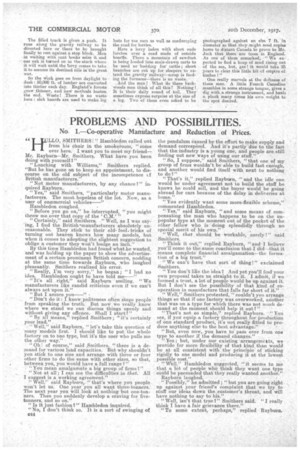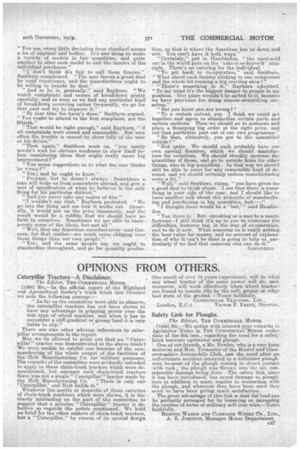PROBLEMS AND POSSIBILITIES.
Page 16

Page 17

If you've noticed an error in this article please click here to report it so we can fix it.
No. 1.—Co-operative Manufacture and Reduction of Prices.
6 ‘ 'ILO, SMITHERS1" Hambledon called out
from his chair in the smokeroom, " come over here. I want you to meet my friend— Mr. Rayburn—Mr. Smithers. What have you been doing' with yourself-?" "Lunching with Williams," Smithers replied. "But he has gone on to keep an appointment, to discourse on the old subject of the incompetence cf British manufacturers."
"Not motor manufacturers, by any chance 2 " inquired Rayburn.
"Yes," said Sinithers, "Particularly motor manufacturers. The most hopeless of the lot. Now, as a user of commercial vehicles—"
Hambledon coughed. "Before you go on," he interrupted, "you might throw me over that copy of the ' C.M.' "
"Certainly," said Smithers. "Well, as I was saying, I find the British imanufacturers absolutely unreasonable. They stick to their old, fool. tricks of turning out heaven knows how many models, but when it comes to adopting the slightest suggestion to oblige a customer they won't budge an inch."
By this time Hambledon had found what he wanted, 'and was holding up the paper to show the advertisement of a certain prominent British concern, nodding at the same time towards Rayburn, who laughed pleasantly. Smithers realized his error. "Really, I'm very sorry," he began ; "I had no idea. Hambledon ought to have told me--" "It's all right," said Rayburn smiling. "We manufacturers like candid criticism even if we can't always act upon it." "But I assure you—"
"Don't do it : I know politeness often stops peeple from speaking the truth. But now we really know where we stand we can discuss things openly and without giving any offence. Shall I start?"
"By all means, relied Smithers ; "it's certainly your lead."
. " Well," said Rayburn, "let's take this question of many 'models first. I should like to put the whole factory on to bne type, but it's the user who pulls me
the Other way." .
• " Oh ! of course," said ,Smithers, "there is a demand for various load capacities. But why shouldn't you Stick to one size and arrange with three or four other firms to do the same with other sizes, so that, between you, you would have a, full range ?" "You mean amalgaMate a big group of firms ?" "Not at all ; I can see the difficulties in that. All I suggest is a working agreement."
" Well," said Rayburn," that's where you people won't let us. One year you all want three-tonners. The next year you will look at nothing but one-tonners. Then you suddenly develop a craving for fivetonners, and so on." "Is it just fashion?" Hambledon inquired. "No, I don't think so. It is a sort of swinging of c44
the pendulum caused by the effort to make supply and demand correspond. And it's partly -due to the fact that the industry is a young one, and people are still finding out new ways of using our stuff."
"So, I suppose," said Smithers, "that one of my group of firms wouldn't be able to build fast enaugh, and another would find itself with next to nothing to do ? "
"That's it," replied Raybezn, "and the idle one would be under agreement not to build the stuff he knows he could sell, and the buyer would be going abroad for cars because of the delay in deliveries at home.'
"You evidently want some more-flexible scheme," commented Hambledon.
"Yes," said Rayburn, "and some means of compensating the man who happens to be on the unpopular type at the moment out of the pocket of the other fellow who is doing splendidly through no special merit of his own." •
"Well, that should_ be workable, surely ?" said Smithers.
"Think it out," replied Rayburn, "and I believe you'll come to the same conclusion that I did—that it means complete financial amalgamation—the formation of a big trust" "We can't have that sort of thing!" exclaimed Smithers.
"You don't like the idea ? And yet you'll find your own proposal takes us straight to it. I admit, if we formed a trust, a lot of people would be up against it. But I don't see the possibility of that kind of cooperation in manufacture that falls far short of it." Well," Smithers protested, "couldn't you arrange things so that if one factory was overworked, another that was on a type for which there was not much demand at the moment should help it out?"
"That's not so simple," replied Rayburn. " You see, if you equip a factory throughout for Production of one standard product, it's not really fitted to pro duce anything else to the best advantage:" ' " But, even now, you have to pass over from one type to another if the demand changes." , " Yes ; but, under our existing arrangeme its, we provide for more flexibility of that kind than would be at all consistent with the principle of sticking rigidly to one model and producing it at the lowest possible cost." " " Hambledon suggeEted, "it seems to me that a lot of people who think they want one type could he persuaded that they really wanted another." Rayburn laughed.
"Possibly," he admitted ; " butyou are going right up against your friend's complaint that we try to stuff our ideas down the. customer's throat, and will have nothing to say to his."
"Well, isn't that true ?" Smithers said. "I really think I have a fair grievance there." "To some extent, perhaps," replied -Rayburn. "You see, every little deviation from standard means a lot of expense and bother. It's one thing to make a variety of models in fair quantities, and quite another to alter each model to suit the fancies of the individual purchaser."
"I don't think it's fair to call them fancies," Smithers complained. "The user learns a great deal by road experience, •and the manufacturer ought to be willing to benefit by that." "And so he is, generally," said Rayburn. "We watch complaints and causes of breakdown pretty carefully, and as soon as we find any particular kind of breakdowa occurring rather frequently, we go for that part and try to improve it." "By that time the harm's done," Smithers argued. "You ought to attend to the first complaint, not the fiftieth."
"That would he right enough," said Rayburn, "if all complaints were sound and reasonable. But very often the trouble is caused by sheer folly of the user or his driver."
"Then again," Smithers went on, "you surely needn't wait for obvious weakness to show itself before considering ideas that might really mean big improvement You mean suggestions as to what the user thinks he wants'?
" Yes ; and he ought to know.", "Perhaps, but he doesn't always. Sometimes a man will write us from somewhere abroad, and give a sort of specification of what he believes is the only thing for his particular district." "And you never take any notice of him." "I wouldn't Gay that," Rayburn protested. "We go into the thing and see how it works out. Generally, it would put up the price immensely, and the result would be a vehicle that we should have no faith-in ourselves. Sometimes we are able to incorporate some of the ideas, but not all." "Well, they say American manufacturers—and German, for that matter—are much more obliging over these things than our own people."
" Yes ; and the same people say we ought to standardize throughout, and go for quantity_ produc
tion, as that is where the American has us down and out. You can't have it both ways." ",Certainly," put in Hambledon, "the most-sold ear in the world goes on the ' take-it-or-leave-it ' There's no catering for the individual. • To get back to co-operation," said Smithers. "What about each• factory sticking to one component and the whole lot running a big erecting shop?"
"There's something in it," Rayburn admitted. "To my mind it's the biggest danger to people in my position. Our place wouldn't be anited to it, because we have provision for doing,almosteeverything ourselves."
"But you know you are wrong?" "To a certain extent, yes. I think we could get together and agree to standardize certain parts and certain sections. Then we should go to someone and place a thumping big order at the right price, and cut that particular part out of our own programme." "So that, ultimately, you get to the assembled vehicle ? "
"Not quite. We should each probably have our own special features, which we should manufacture for ourselves. We should steadily increase the quantities of those, and go to outside firms for other things, also in big quantities. In that way we should still be able to cater for any reasonable kind of demand, and we should certainly reduce manufacturing costs a lot."
"Well," said Smithers, rising, "you have given me a good deal to think about. I see that there is something in your side of the case, and I should like to have another talk about this principle of standardizing and purchasing in big quantities, but—" "I thought there would be a ' but,' " said Rambledon.
"Yes, there is. But—speaking as a user to a manufacturer—I still think it's up to you to overcome the difficulties, however big, in the way of co-operation, i and to do t now. What concerns us is really getting the best value for money, and no amount of explanation of why it can't be done is going to help us, particularly if we find that someone else can do it."
























